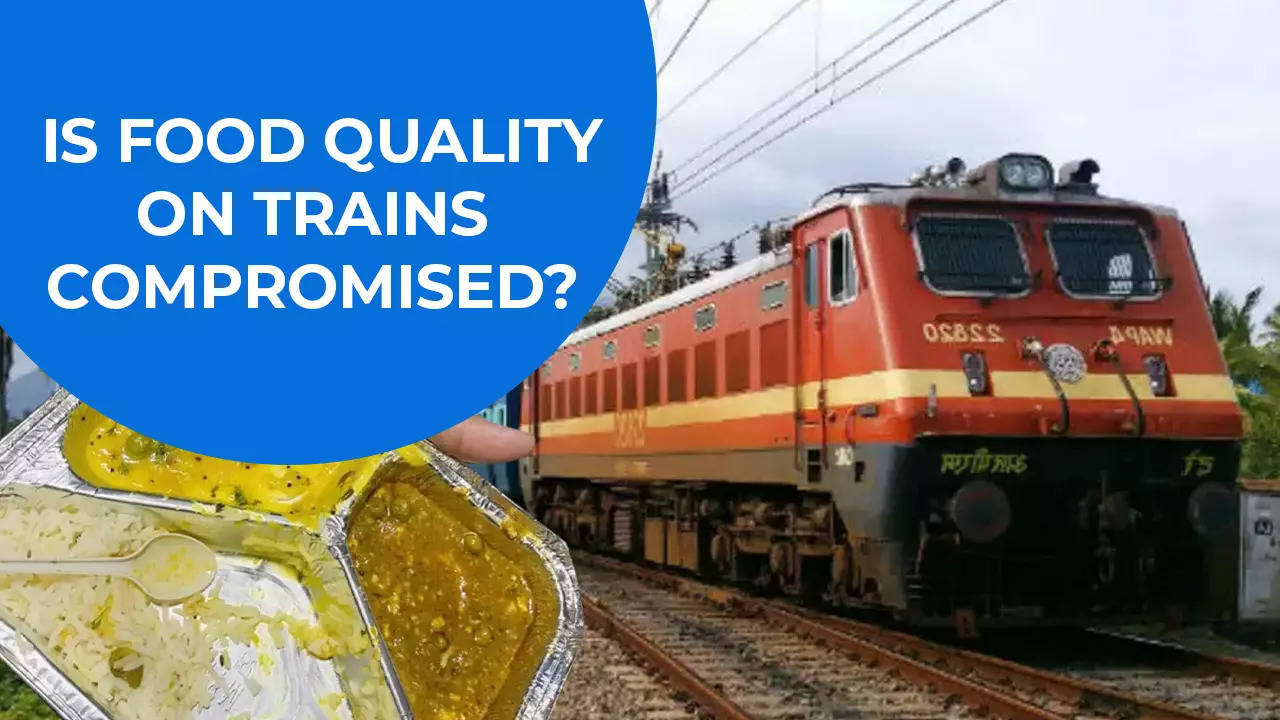[ad_1]
Meals on Indian Railways trains: The Public Accounts Committee has lately offered a report back to the Lok Sabha, stating that frequent adjustments within the railways’ catering coverage and discrepancies in its implementation have led to compromised meals high quality, hygiene, and cleanliness. The committee, chaired by Congress MP Adhir Ranjan Chowdhury, carried out an in depth examination of the railways’ catering coverage and its affect on meals providers in trains.
Based on PTI, the report, titled ‘Catering Service in Indian Railways,’ discovered that a number of catering actions, initially assigned to the Indian Railway Catering and Tourism Company (IRCTC) within the 2005 coverage, have been transferred to the zonal railways as per the 2010 coverage, after which reassigned again to the IRCTC within the 2017 coverage.
The committee said that frequent adjustments in catering coverage and the ensuing switch of duty from railways to IRCTC and again have created a state of uncertainty within the administration of catering providers offered to the passengers. The report additionally highlighted discrepancies within the implementation of the 2017 Catering Coverage.
Additionally Learn | Defined: What’s Vande Bharat customary of trains to which 40,000 Indian Railways coaches will likely be upgraded?
A number of the discrepancies embrace the absence of a pantry in sure long-distance trains, base kitchens positioned exterior railway premises leading to compromised meals high quality, hygiene, and cleanliness, presence of unauthorized distributors on platforms and trains, and unfair practices at stations and trains.
Expressing concern in regards to the high quality of meals served on trains, the report talked about that the IRCTC was presupposed to arrange base kitchens on railway premises for monitoring and controlling the standard and hygiene of the meals being cooked, as per the 2017 coverage. Nonetheless, out of the 131 base kitchens, solely 16 have been positioned contained in the railway premises, whereas the remaining 115 have been located exterior and weren’t subjected to high quality checks.
The report said that since meals was being procured from exterior, it was evidently not subjected to common and fixed high quality checks, thus failing to make sure high quality, hygiene, and cleanliness.
Additionally Learn | Swiss experience for Indian Railways! Collaboration with Switzerland companies for tunnelling works
The report revealed that seven zonal railways failed to organize the grasp plan for meals providers, as required by the 2017 coverage, till an audit pointed it out. These railway zones are East Central, Japanese, Northeast Frontier, North Western, South Japanese, South Western, and East Coast Railways.
The report additionally talked about that in accordance with the Catering Coverage of 2010, gasoline burners in pantry vehicles have been supposed to get replaced with electrical energy gear to stop fireplace accidents. Nonetheless, the committee discovered that 103 pantry vehicles manufactured by Integral Coach Manufacturing facility throughout April 2011 to March 2016 have been geared up with centralized LPG cylinders with open flames as an alternative of electrical energy gear.
The railways has changed the Integral Coach Manufacturing facility (ICF) coaches with Linke Hofmann Busch (LHB) coaches, and solely LHB pantry vehicles are being manufactured now, progressively phasing out the ICF pantry vehicles.
Additionally See | Dehradun airport: New terminal constructing (Section II) of Jolly Grant airport inaugurated; verify prime pictures & info
The committee additionally highlighted the absence of pantry vehicles in a number of long-distance trains that run for greater than 24 hours. This led to the presence of unauthorized distributors on trains, promoting unhygienic and unhealthy meals merchandise, posing a security risk to the passengers, the report mentioned.
The report emphasised the necessity for Indian Railways and IRCTC to enhance their catering providers on working trains, platforms, and different areas the place passengers require them. It known as for a holistic and steady effort to profit the commuters.
Based on PTI, the report, titled ‘Catering Service in Indian Railways,’ discovered that a number of catering actions, initially assigned to the Indian Railway Catering and Tourism Company (IRCTC) within the 2005 coverage, have been transferred to the zonal railways as per the 2010 coverage, after which reassigned again to the IRCTC within the 2017 coverage.
The committee said that frequent adjustments in catering coverage and the ensuing switch of duty from railways to IRCTC and again have created a state of uncertainty within the administration of catering providers offered to the passengers. The report additionally highlighted discrepancies within the implementation of the 2017 Catering Coverage.
Additionally Learn | Defined: What’s Vande Bharat customary of trains to which 40,000 Indian Railways coaches will likely be upgraded?
A number of the discrepancies embrace the absence of a pantry in sure long-distance trains, base kitchens positioned exterior railway premises leading to compromised meals high quality, hygiene, and cleanliness, presence of unauthorized distributors on platforms and trains, and unfair practices at stations and trains.
Expressing concern in regards to the high quality of meals served on trains, the report talked about that the IRCTC was presupposed to arrange base kitchens on railway premises for monitoring and controlling the standard and hygiene of the meals being cooked, as per the 2017 coverage. Nonetheless, out of the 131 base kitchens, solely 16 have been positioned contained in the railway premises, whereas the remaining 115 have been located exterior and weren’t subjected to high quality checks.
The report said that since meals was being procured from exterior, it was evidently not subjected to common and fixed high quality checks, thus failing to make sure high quality, hygiene, and cleanliness.
Additionally Learn | Swiss experience for Indian Railways! Collaboration with Switzerland companies for tunnelling works
The report revealed that seven zonal railways failed to organize the grasp plan for meals providers, as required by the 2017 coverage, till an audit pointed it out. These railway zones are East Central, Japanese, Northeast Frontier, North Western, South Japanese, South Western, and East Coast Railways.
The report additionally talked about that in accordance with the Catering Coverage of 2010, gasoline burners in pantry vehicles have been supposed to get replaced with electrical energy gear to stop fireplace accidents. Nonetheless, the committee discovered that 103 pantry vehicles manufactured by Integral Coach Manufacturing facility throughout April 2011 to March 2016 have been geared up with centralized LPG cylinders with open flames as an alternative of electrical energy gear.
The railways has changed the Integral Coach Manufacturing facility (ICF) coaches with Linke Hofmann Busch (LHB) coaches, and solely LHB pantry vehicles are being manufactured now, progressively phasing out the ICF pantry vehicles.
Additionally See | Dehradun airport: New terminal constructing (Section II) of Jolly Grant airport inaugurated; verify prime pictures & info
The committee additionally highlighted the absence of pantry vehicles in a number of long-distance trains that run for greater than 24 hours. This led to the presence of unauthorized distributors on trains, promoting unhygienic and unhealthy meals merchandise, posing a security risk to the passengers, the report mentioned.
The report emphasised the necessity for Indian Railways and IRCTC to enhance their catering providers on working trains, platforms, and different areas the place passengers require them. It known as for a holistic and steady effort to profit the commuters.
[ad_2]
Supply hyperlink


